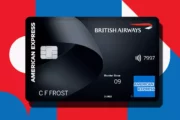-
If your employer is that petty they would take disciplinary action over some Avios earned on work legitimate work travel then used for personal travel it’s really not worth staying with that employer so I wouldn’t care if I was moved to the get rid of quick list … May even help in a future legal case.
This exactly! Rather a warning light on what kind of employer you’re working for and whether they’re worth your time.
Typical fear mongering I see over the use of SARs – a SAR is legitimate in this type of case. Any funny business in responding to it or change of attitude after having made the request would helpfully feed into an employment tribunal case. Advice to not do it so as not to upset Mr Boss Man seems rather anachronistic in 2023.
It isn’t “fear mongering” – doing a SAR to your employer (or any organisation) signals a breakdown in trust so should only be used after very careful consideration of what you hope to achieve, how/if that will actually help you and how an employer might respond. Sometimes people use it when they are negotiating an exit package. If an employer is concerned that there are say certain emails better not disclosed it may aid negotiation but if the employer is happy everything is fine, they may respond to the SAR by complying but playing hardball. I have seen both.
I would add also that I have seen people on their way out making trouble; this always gets out and in some industries, once you get the ‘difficult’ tag, you won’t find good work in that industry again.
Typical fear mongering I see over the use of SARs – a SAR is legitimate in this type of case. Any funny business in responding to it or change of attitude after having made the request would helpfully feed into an employment tribunal case. Advice to not do it so as not to upset Mr Boss Man seems rather anachronistic in 2023.
Indeed. Using a lawful request (be it a SAR or anything else) to treat an employee differently, is half way there to support your case further if legal action is warranted. And to add to others’ point about not wanting to be employeed by a company that makes Avios an issue, this is another red flag (of course, this is easier said that done, and the OP might not have other easy employment opportunities).
In my company, a SAR of an employee would not even be known to anyone in the organisation beyong the people taking care of it.
But we’ve heard here before that SAR’ing financial institutions is petty and an unreasonable burden on them, so not really surprised that they feel the same way about employees. Rights are hard to understand to some.(This shouldn’t be seen as advice to the OP to request a SAR, I don’t know enough about the case to advise one way or the other.)
I’ve always understood that airline loyalty points actually belong to the airline and are accrued to the frequent flyer account of the passenger that actually takes a flight regardless of who paid for the flight as companies cannot be individual members of airline frequent flyer schemes (certainly true of BAEC).
So using Avios earned on flying on business for your employer for your own personal holiday is perfectly legitimate (in the UK anyway). I have never known any UK employer to insist that Avios earned on flights paid for by a business can only be used for future company business flights.
The only “points” that belong to a business are those earned via BA’s On Business scheme. I could see using On Business points for a personal flight would be frowned upon.
I hope the OP will keep us informed and wish his friend luck.
On reflection, recording could be dangerous if accidentally revealed – although I wouldn’t put it past some employers to do it. And agree with @JDB that doing a DSAR might (unfairly) be provocative. As JDB has hinted perhaps it could be done later if things go badly and more data might be available!
I’ve always understood that airline loyalty points actually belong to the airline and are accrued to the frequent flyer account of the passenger that actually takes a flight regardless of who paid for the flight as companies cannot be individual members of airline frequent flyer schemes (certainly true of BAEC).
So using Avios earned on flying on business for your employer for your own personal holiday is perfectly legitimate (in the UK anyway). I have never known any UK employer to insist that Avios earned on flights paid for by a business can only be used for future company business flights.
The only “points” that belong to a business are those earned via BA’s On Business scheme. I could see using On Business points for a personal flight would be frowned upon.
Might be reason enough to NOT provide a FF# at the time of booking, retain boarding passes and manually claim post-trip.
I’ve always understood that airline loyalty points actually belong to the airline and are accrued to the frequent flyer account of the passenger that actually takes a flight regardless of who paid for the flight as companies cannot be individual members of airline frequent flyer schemes (certainly true of BAEC).
So using Avios earned on flying on business for your employer for your own personal holiday is perfectly legitimate (in the UK anyway). I have never known any UK employer to insist that Avios earned on flights paid for by a business can only be used for future company business flights.
The only “points” that belong to a business are those earned via BA’s On Business scheme. I could see using On Business points for a personal flight would be frowned upon.
Might be reason enough to NOT provide a FF# at the time of booking, retain boarding passes and manually claim post-trip.
I was thinking this. They may be able to see the BAEC number if it is added before the flight is taken, but they shouldn’t be able to if it is added on at check-in or claimed after?
If your employer is that petty they would take disciplinary action over some Avios earned on work legitimate work travel then used for personal travel it’s really not worth staying with that employer so I wouldn’t care if I was moved to the get rid of quick list … May even help in a future legal case.
This exactly! Rather a warning light on what kind of employer you’re working for and whether they’re worth your time.
Typical fear mongering I see over the use of SARs – a SAR is legitimate in this type of case. Any funny business in responding to it or change of attitude after having made the request would helpfully feed into an employment tribunal case. Advice to not do it so as not to upset Mr Boss Man seems rather anachronistic in 2023.
It isn’t “fear mongering” – doing a SAR to your employer (or any organisation) signals a breakdown in trust so should only be used after very careful consideration of what you hope to achieve, how/if that will actually help you and how an employer might respond. Sometimes people use it when they are negotiating an exit package. If an employer is concerned that there are say certain emails better not disclosed it may aid negotiation but if the employer is happy everything is fine, they may respond to the SAR by complying but playing hardball. I have seen both.
I would add also that I have seen people on their way out making trouble; this always gets out and in some industries, once you get the ‘difficult’ tag, you won’t find good work in that industry again.
If I hadn’t done a SAR on a previous employer, I would never have discovered that one of the Directors had said in an email:-
“He’s coming into London on Monday for a disciplinary meeting, do we know anyone who can give him a push on the Tube?”
Apparently it was a joke…
I suspect the only reason it was missed because they had to redo the SAR and redactions in a hurry after the first one was ruined after the pallet of paper boxes was dropped kerbside by the courier and sat in the rain for a few days as I was on holiday.
We don’t know the full nature of the alleged misdemeanour here but if the collection of loyalty miles isn’t expressly forbidden by company policy, I suspect the underlying issue may be the use of Avios to reduce the cash price of a ticket for business travel while the full price (pre discount) has been submitted for reimbursement. Although it sounds petty (and it is in the grand scheme of things), I can imagine many employers would be miffed to find that their employee has part paid with loyalty points but wants a full refund of the purchase in cash, effectively selling loyalty points to their employer for cash. The fact that points have no legal cash value is an aggravating factor, on paper it’s like selling Monopoly money in exchange for legal tender. On top of all this, some or all of the points used have been earned on business travel at no direct cost to the employee, taken in aggregate the optics of this are poor it can come across as fiddling expenses. If I were presented with this opportunity, I’d ensure I pay fully in cash and submit a claim for the same cash amount.
We don’t know the full nature of the alleged misdemeanour here but if the collection of loyalty miles isn’t expressly forbidden by company policy, I suspect the underlying issue may be the use of Avios to reduce the cash price of a ticket for business travel while the full price (pre discount) has been submitted for reimbursement. Although it sounds petty (and it is in the grand scheme of things), I can imagine many employers would be miffed to find that their employee has part paid with loyalty points but wants a full refund of the purchase in cash, effectively selling loyalty points to their employer for cash. The fact that points have no legal cash value is an aggravating factor, on paper it’s like selling Monopoly money in exchange for legal tender. On top of all this, some or all of the points used have been earned on business travel at no direct cost to the employee, taken in aggregate the optics of this are poor it can come across as fiddling expenses. If I were presented with this opportunity, I’d ensure I pay fully in cash and submit a claim for the same cash amount.
Aha….interesting. That may well be it. Completely agree, you just pay in cash and claim the cash amount. I haven’t the energy to even imagine trying to explain paying with points but wanting cash expense refund to my employer.
We don’t know the full nature of the alleged misdemeanour here but if the collection of loyalty miles isn’t expressly forbidden by company policy, I suspect the underlying issue may be the use of Avios to reduce the cash price of a ticket for business travel while the full price (pre discount) has been submitted for reimbursement. Although it sounds petty (and it is in the grand scheme of things), I can imagine many employers would be miffed to find that their employee has part paid with loyalty points but wants a full refund of the purchase in cash, effectively selling loyalty points to their employer for cash. The fact that points have no legal cash value is an aggravating factor, on paper it’s like selling Monopoly money in exchange for legal tender. On top of all this, some or all of the points used have been earned on business travel at no direct cost to the employee, taken in aggregate the optics of this are poor it can come across as fiddling expenses. If I were presented with this opportunity, I’d ensure I pay fully in cash and submit a claim for the same cash amount.
In the original post they say it was to reduce the cost of a personal flight, which i took that to mean that it was not a business related flight. If it was then i could see how they would be a bit upset!
If your employer is that petty they would take disciplinary action over some Avios earned on work legitimate work travel then used for personal travel it’s really not worth staying with that employer so I wouldn’t care if I was moved to the get rid of quick list … May even help in a future legal case.
This exactly! Rather a warning light on what kind of employer you’re working for and whether they’re worth your time.
Typical fear mongering I see over the use of SARs – a SAR is legitimate in this type of case. Any funny business in responding to it or change of attitude after having made the request would helpfully feed into an employment tribunal case. Advice to not do it so as not to upset Mr Boss Man seems rather anachronistic in 2023.
It isn’t “fear mongering” – doing a SAR to your employer (or any organisation) signals a breakdown in trust so should only be used after very careful consideration of what you hope to achieve, how/if that will actually help you and how an employer might respond. Sometimes people use it when they are negotiating an exit package. If an employer is concerned that there are say certain emails better not disclosed it may aid negotiation but if the employer is happy everything is fine, they may respond to the SAR by complying but playing hardball. I have seen both.
I would add also that I have seen people on their way out making trouble; this always gets out and in some industries, once you get the ‘difficult’ tag, you won’t find good work in that industry again.
If I hadn’t done a SAR on a previous employer, I would never have discovered that one of the Directors had said in an email:-
“He’s coming into London on Monday for a disciplinary meeting, do we know anyone who can give him a push on the Tube?”
Apparently it was a joke…
I suspect the only reason it was missed because they had to redo the SAR and redactions in a hurry after the first one was ruined after the pallet of paper boxes was dropped kerbside by the courier and sat in the rain for a few days as I was on holiday.
Andrew I recall you pallet story fondly. Was very entertaining at the time; perhaps less so for you!
Either something isn’t fully being told in this “hypothetical” story, or, if it is the case, it’s sounds more like the employer is trying to get the employee out the door and trying to throw as much dirt at the wall and hooding something sticks.
From what I remember on the legality side and tax side of things, in the uk the collection of points on expenses is fine, but I guess there’s a lot more going on that we’re being told on this one.
Agree with all of those who have said that there must be more to this, and various posters have described potential scenarios. If there’s an allegation of fraud/dishonesty here, which would seem to be the logical conclusion of many of the scenarios, then this is potentially gross misconduct, regardless of how small the amount is. Given that, and that one of the possible outcomes of that is dismissal, the SAR may not be as bridge-burning as some fear. I agree that in most circumstances requesting a SAR is indicative of broken trust, but it appears that there are already indicators of this, and that the SAR would therefore not make much difference.
But this all depends, of course, on what the OP’s “friend” actually did, what the policy says, how his employer discovered the potential misconduct, and why they are taking issue with it. Until we know the answers to those questions, we’re all just speculating.
@JDB I’d say disciplinary action over £100 of Avios already means there’s a break down of a relationship.
@JDB I’d say disciplinary action over £100 of Avios already means there’s a break down of a relationship.
You may well be right, but sometimes these disciplinary things appear from nowhere created by a troublemaker or jobsworth. I just urge careful consideration rather than rushing into a SAR; it may or may not be the right answer in the circumstances. The story doesn’t really make sense with someone supposedly “about to go to a disciplinary” hearing without knowing what the allegation is and it’s strange that someone who travels for business wouldn’t know their company policy on miles.
My simple response to the OP would be to enquire how the policy has been communicated to staff. Often there are all kinds of requirements hidden away, but unless the company has made an effort to communicate them, it is unreasonable to expect everyone to know them.
My old company did have this as a policy, i.e. FF points (or indeed any other benefits) ‘belonged’ to the company and could not be used for personal travel. Theoretically you were supposed to use them for business travel, but I never heard of anyone actually doing this.
In practice, everyone I knew either completely ignored this and used them anyway – just discreetly – or stored them up until they left.
My old company did have this as a policy,
I worked with one company that denied expenses claims if there was any benefit to the employee. Case in point: an employee bought something in Tesco, produced the receipt with the bottom cut off to remove the Clubcard mini-statement, claim denied.
How things can end up this petty I have no idea.
My old company did have this as a policy,
I worked with one company that denied expenses claims if there was any benefit to the employee. Case in point: an employee bought something in Tesco, produced the receipt with the bottom cut off to remove the Clubcard mini-statement, claim denied.
How things can end up this petty I have no idea.
Now THAT is truly extraordinary. I’d struggle to hold my tongue if an employer did that to me with a straight face. It’s not as if any of these loyalty schemes offer a meaningful return on spend, it’s generally a penny in the pound or not even that. What would the same employer say if you round up a £4.98 bill at McDonalds to £5 with a 2 pence contribution to the Ronald McDonald charity?
Well… the pettiness and vindictiveness of some people, including some in departments where they don’t travel or have expenses for the firm, but might be processing your expenses claim or close to someone who is, can be more of a factor than some realise.
A couple of my best stories were connected with expense claims…
I suppose that if the avios and others points earned during the flight belong to the company then the flight is working time and all time travelling should go to overtime. Tell them that and I am sure they will agree to give you your avios back.
I suppose that if the avios and others points earned during the flight belong to the company then the flight is working time and all time travelling should go to overtime. Tell them that and I am sure they will agree to give you your avios back.
Funny you should say that. At the outfit that denied the Tesco-with-clubcard claim people often travelled in work time or claimed time-off in lieu or overtime for travel. Punctilious observation of the small print in employment contracts can cut both ways.
I suppose that if the avios and others points earned during the flight belong to the company then the flight is working time and all time travelling should go to overtime. Tell them that and I am sure they will agree to give you your avios back.
Indeed, at a company I worked at when they introduced the premium only policy for transatlantic travel (rather than business), a lot of the travel to the US changed to be on a Monday rather than Sunday, and return to UK Thursday night/arrive Friday morning rather than Friday night/Saturday morning.
This inevitable result of decisions being taken by corporate leaders that lack emotional intelligence due to them sitting somewhere on the psychopathy spectrum and therefore failing to preempt the quite natural behaviour of their employees.
I suppose that if the avios and others points earned during the flight belong to the company then the flight is working time and all time travelling should go to overtime. Tell them that and I am sure they will agree to give you your avios back.
Indeed, at a company I worked at when they introduced the premium only policy for transatlantic travel (rather than business), a lot of the travel to the US changed to be on a Monday rather than Sunday, and return to UK Thursday night/arrive Friday morning rather than Friday night/Saturday morning.
At one company I worked for the standard was economy. Travel in business class was only possible if the actual flight time was in excess of 8.5 hours which cut out a lot of LHR to eastern seaboard of the USA. They wouldn’t even agree to Premium Economy. As a result we had the standard of flying Monday to the USA and return on Friday night arriving on a Saturday morning. It was agreed that we sacrificed the Friday night since we got a day off in lieu. I did a separate deal with my boss where I flew Premium Economy in both directions flying out on Saturday before returning on Friday night and the company paid for hotel and meals on Saturday and Sunday as it was cheaper than flying economy Monday returning Friday. It also meant I was in the office in the USA on the Monday morning so they got a full 5 days of me in the office. I got to see a lot of cities on the eastern seaboard and also had a lot of success being upgraded from WTP to Club on the Saturday flights.
- You must be logged in to reply to this topic.
Popular articles this week:

















